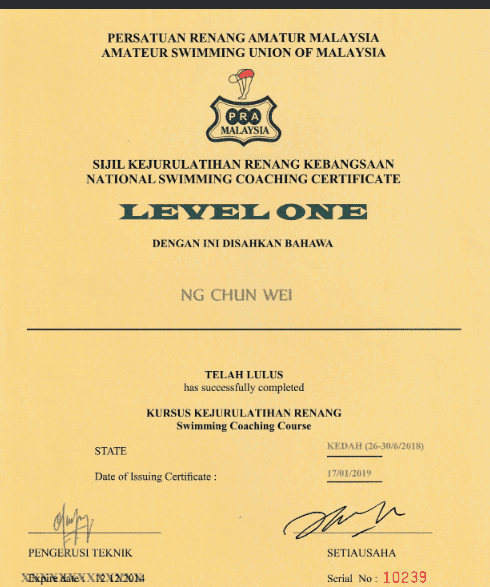At what age should your child start swim lessons? Many experts recommend starting at age 1. In this article, we’ll explore the best swim lessons age and help you decide the right time for your child to begin.
Key Takeaways
- Children can start swimming lessons as early as six months to build comfort and confidence in the water, fostering emotional and cognitive development.
- Tailored swim programs that consider a child’s age, emotional maturity, and physical abilities enhance their learning experience and promote long-term skills.
- Regular adult supervision during swimming activities ensures safety and supports children’s confidence while learning essential water skills.
The Right Age to Start Swim Lessons
Determining the right time for your child to start swim lessons can be challenging. According to the American Academy of Pediatrics, children can start swim lessons as early as age 1. Some experts even suggest that babies as young as six months can begin learning to swim in a secure environment with proper instruction. This early start helps children acclimate to the water, making them more comfortable and confident swimmers as they grow.
However, it’s essential to consider your child’s emotional readiness. Emotional maturity can significantly impact their swimming experience, affecting their overall comfort in water. Age-appropriate swim programs provide a safe and secure environment that supports children’s development across various domains, including social, intellectual, physical, and emotional. Prioritizing developmentally appropriate methods over forced practices ensures that your child has a positive experience.
Starting swim lessons early can lead to improved comfort and confidence in the water, promoting long-term safety and health benefits. It also positively influences children’s academic performance in areas like numeracy and literacy. The perfect time to start swim lessons varies for each child, but beginning at an early age can set the foundation for a lifelong swimming journey.
Early Introduction to Water
Introducing your baby to water early on can be a game-changer. It helps them acclimate to water, building their comfort and confidence. When babies are introduced to swimming, they experience enhanced cognitive and emotional development, which is crucial during their early years. Water provides a unique environment for babies to move freely, promoting muscle development and physical strength.
Swim lessons can start as early as six months, helping infants acclimate to water and bond with caregivers. Regular swimming in early childhood can lead to improved lung capacity and better cardiovascular health. These physical benefits are just the beginning; early swim lessons also foster emotional bonding between parents and their babies, making the experience enjoyable and memorable.
Early water introduction sets the stage for confident swimmers. Starting young provides ample time for skill development in a safe and supportive environment for little ones, making an earlier significant difference in their swimming journey, leaving parents wondering about the benefits.
Toddlers Learning to Swim
As toddlers, children start developing water confidence and basic swimming skills. Research indicates that around the age of four, children typically begin to feel more comfortable in the water and can start learning fundamental swimming techniques. Physical development, along with motor skills, plays a crucial role in determining a child’s readiness for swimming lessons.
Swim lessons for toddlers focus on fun and water explore. Under trained instructors’ guidance, they learn to float, kick, and move their arms, laying the foundation for advanced swimming techniques as they grow, including floating.
Many parents question if their toddlers are too young for swim lessons. With a supportive environment and tailored instruction, toddlers can safely and effectively learn to swim, ensuring the experience is enjoyable and beneficial for their overall development.
Preschoolers and Swimming Lessons
Preschoolers are at an ideal age to start swim lessons. Studies indicate that children often begin mastering water confidence and basic swimming skills around the age of four. Early swim classes may enhance physical, cognitive, and language development in children aged three to five. Engaging preschoolers in swimming lessons promotes their social skills through interaction with peers.
Structured swim lessons benefit preschoolers by supporting physical fitness and cognitive development, laying the foundation for future academic success. They also help develop motor skills, coordination, and strength, essential for growth and training.
Beginning swim lessons around age four supports physical fitness and cognitive development. It offers a fun, interactive way for preschoolers to learn swimming skills, build confidence, and enjoy the water. Social interactions during lessons also enhance emotional and social development.
Factors Influencing the Right Age
Choosing the right age for swim lessons depends on factors like emotional maturity, physical abilities, and comfort level. Each child is unique, and what works for one may not be suitable for another.
Parents should pay attention to their child’s comfort level in water and their ability to follow instructions. Some children ages may be ready to start swim lessons at an early age, while others may need more waiting trouble to develop the necessary skills and confidence. It is essential for children to learn how to swim.
Recognizing these factors aid parents and families in making informed decisions, ensuring a positive and successful swim lesson experience for their child.
Choosing the Best Swim Program
Selecting the right swim program is essential for your child’s success in learning to swim. Qualified swim instructors should be trained and certified through a nationally recognized curriculum to ensure safety during lessons. Instructors should teach essential water safety skills alongside swimming techniques, as safety is a crucial aspect of learning to swim. A swim teacher can play a vital role in this process.
Tailoring swim lessons to specific age groups addresses developmental needs and promotes skill levels progression. Consistent attendance is critical for achieving safe swimming skills and reinforcing learning. Programs offering multiple lessons support skill development and build confidence.
Parents should engage with professional instructors to understand their child’s strengths and areas for improvement. Encouraging regular practice outside lessons helps children gain confidence and improve basic skills. Open communication fosters motivation and helps parents track progress in teaching, benefiting the entire family, keeping support within arm’s reach.
Selecting clean, well-maintained swim facilities and pools promotes health and energy comfort. Temperature-controlled water ensures young children’s comfort and safety during lessons.
Benefits of Starting Swim Lessons Early
Early swim lessons offer numerous benefits. Babies can learn essential water safety skills, significantly reducing drowning risks and future water-related anxieties.
Early swim lessons promote strength, flexibility, and motor skills, enhancing physical health. They also boost a child’s comfort and confidence in water. A fun, positive atmosphere can cultivate enthusiasm and commitment to swimming.
Swim lessons can foster positive emotional experiences, aiding emotional development. An enjoyable, supportive environment helps children develop a lifelong love for swimming.
Importance of Adult Supervision
Adult supervision is crucial during swimming activities to prevent drowning, which can occur rapidly and quietly. Safety devices should complement, not replace, vigilant touch supervision. A designated adult focused on supervising enhances safety.
Constant adult supervision ensures children’s safety while they learn to swim and enjoy the water. A responsible adult who can respond quickly in an emergency provides peace of mind and mitigates risk in a safe environment.
Signs Your Child is Ready for Swim Lessons
Parents should assess their child’s enthusiasm for water as a readiness indicator for swim lessons. Factors include frequent water exposure, physical coordination, and emotional readiness.
Signs of readiness for swim lessons include a keen interest in water activities, ability to follow simple instructions, and physical coordination for basic movements in the water. If your child shows excitement and demonstrates these abilities, it’s likely the right time to sign up for lessons.
How to Support Your Child’s Swimming Journey
Supporting your child’s swimming journey involves more than just enrollment. Frequent swimming often leads to better performance in lessons. As children learn, they develop a sense of achievement, boosting self-confidence and independence. Swimming classes can also strengthen parent-child bonds through shared water experiences.
Regular practice and positive reinforcement can help your child become a confident swimmer while building confidence. Celebrate milestones, no matter how small, and create a supportive environment to make learning to swim fun and rewarding.
Summary
In summary, starting swim lessons at an early age can provide numerous benefits for your child’s physical, cognitive, and emotional development. From building water confidence to enhancing physical health and promoting safety, early swim lessons set the foundation for a lifelong love of swimming.
Encourage your child’s swimming journey by choosing the right program, ensuring constant supervision, and supporting their progress. With the right approach, you can help your child become a confident and skilled swimmer, ready to enjoy all the benefits that swimming brings.
Frequently Asked Questions
What is the recommended age for a child to start swim lessons?
It’s great to know that the American Academy of Pediatrics recommends starting swim lessons at age 1! Early swimming skills can lead to a lifelong love of the water and safety in aquatic environments.
Can babies as young as six months old start swim lessons?
Absolutely, babies as young as six months can start swim lessons in a safe setting with qualified instructors, setting them on a wonderful path to enjoying water activities. It’s a great way to introduce your little one to swimming!
What are the benefits of starting swim lessons early?
Starting swim lessons early greatly enhances water safety skills and boosts confidence while promoting physical health and emotional development. It’s a fantastic way to ensure your child thrives in and around water!
How can I support my child’s swimming journey?
Encourage your child’s swimming journey by fostering a supportive and positive environment, helping them celebrate their achievements, and ensuring they have fun during practice. Your involvement can make a significant difference in their enjoyment and progress!
Why is adult supervision important during swim lessons?
Adult supervision is essential during swim lessons to significantly reduce the risk of drowning and keep kids safe as they develop their swimming skills. With attentive adults around, you can foster a fun and secure environment for learning.





















